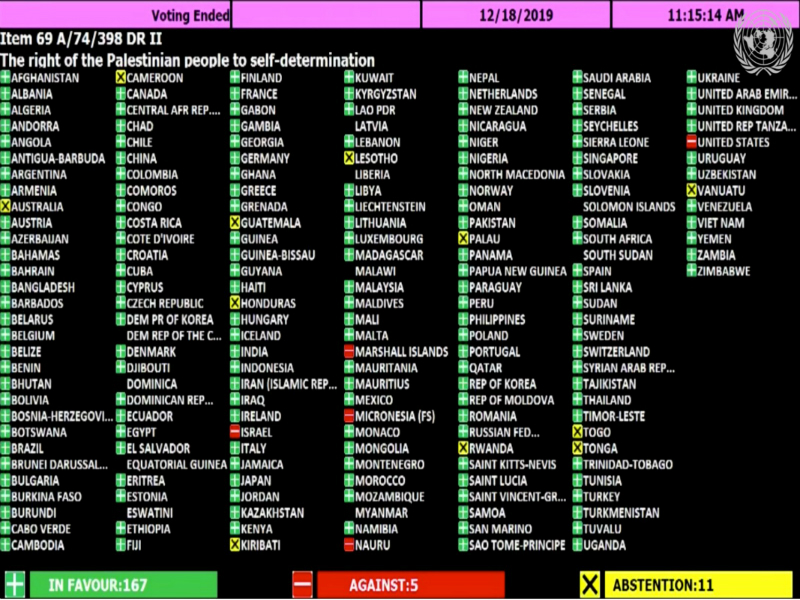Canada has come in for more criticism for ratifying its earlier vote at the United Nations on a resolution that was condemned as anti-Israel.
At the UN General Assembly on Dec. 18, Canada upheld its earlier Yes vote on a measure on “the right of the Palestinian people to self-determination.”
The resolution passed easily, with 167 countries in favour, 11 abstentions and five against. The No votes came from Israel, the United States, Nauru, the Marshall Islands and Micronesia. Earlier reports said the three Pacific nations are heavily dependent on U.S. aid.
A petition by Geneva-based UN Watch urging Canada to reverse its vote at the General Assembly garnered 37,000 signatures.
B’nai Brith Canada said it was “outraged” that Canada ratified its earlier vote.
“This vote reflects poorly on Canada’s record as a defender of democracy and justice,” the organization’s CEO, Michael Mostyn, said in a statement. “It stains Canada’s reputation.”
At a pre-Hanukkah menorah lighting in Ottawa on Dec. 9, Prime Minister Justin Trudeau assured the Jewish community that Canada would “always defend Israel’s right to live in security,” Mostyn noted. Voting for this resolution “is not in line with that commitment,” Mostyn said.
Canada was sharply rebuked last month when it moved from its traditional No vote on a draft of the resolution, to supporting it.
The resolution referenced “occupied Palestinian territory, including east Jerusalem” – its Jewish holy sites included – and said Israel’s security barrier “severely impedes the right of the Palestinian people to self-determination.” Critics slammed the wording for ignoring Palestinian terror and putting the onus for peace in the region on Israel.
The non-binding resolution was submitted by North Korea, Egypt, Nicaragua, Zimbabwe and the “State of Palestine.”
By ratifying its vote, Canada “is losing the moral high ground by voting against its democratic ally, Israel, alongside countries with poor human rights records like North Korea,” commented Avi Benlolo, CEO of Friends of Simon Wiesenthal Center.
Canada’s vote on Nov. 19 at the UN’s social, humanitarian and cultural issues committee prompted Israel’s embassy in Ottawa to lodge a formal protest. Others expressed anger and disappointment that Canada’s shift from a No to a Yes – jumping over abstaining – may have signalled a disturbing departure for support for Israel at the UN.
“I hear you,” Trudeau tried to reassure Jewish Canadians at the menorah lighting. “I understand that many of you were alarmed by this decision.”
Trudeau said Canada felt it had to change course to emphasize its support for a two-state solution to the Israeli-Palestinian conflict.
“The government felt that it was important to reiterate its commitment to a two-states-for-two-peoples solution at a time when its prospects appear increasingly under threat,” Trudeau said. He stressed that Canada “will continue to stand strongly against the singling out of Israel at the UN.”
Hillel Neuer, executive director of UN Watch, wrote Trudeau to say Canada had “joined the jackals” by approving the draft resolution.
Speaking on Dec. 5 at a UN Watch gala, former U.S. ambassador to the UN Nikki Haley also slammed Trudeau’s “deal with the devil,” a reference to the allegation that Canada’s vote was intended to curry favour in its quest for a seat on the UN Security Council.
In a statement to The CJN on the day Canada ratified its vote, Michael Levitt, Liberal MP for York Centre and chair of the multi-party Canada-Israel Interparliamentary Group, said he’s heard “loud and clear the sense of hurt and that many people feel let down.” He said he shared those concerns directly with Trudeau, the foreign minister and Canada’s ambassador to Israel.
But, said Levitt, Canada’s relationship with Israel “is much deeper than one vote.”
He cited the Liberal government’s modernizing of the Canada-Israel Free Trade Agreement, opposing the boycott, divestment and sanctions movement “at every opportunity” and adopting the International Holocaust Remembrance Alliance’s definition of anti-Semitism.
Levitt said he has been assured that no other UN votes will change, “but I truly believe that we can do more.”
Going forward, Canada “should work with like-minded partners and allies to bring this annual charade of Israel-bashing at the UN to an end,” wrote Levitt. “The challenge now is to do the hard work necessary to get things back on track. I am committed to doing that work and continuing to advocate for my constituents and my convictions on this issue.”
The Centre for Israel and Jewish Affairs (CIJA) said it made “vigorous representations” to Ottawa on this matter, including a direct meeting with Trudeau. CIJA “expects that Canada will adopt meaningful and tangible ways to reaffirm its unqualified support for, and friendship with, Israel,” said the group’s CEO, Shimon Koffler Fogel.
The resolution Canada approved was part of an annual spate of UN measures singling out Israel introduced at this time of year. Of the 17 resolutions considered so far this year, either by committees or the General Assembly, Canada voted Yes on one, abstained on two, and sided with Israel by voting No on the remaining 14.
